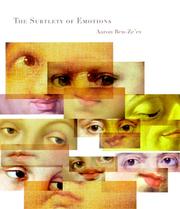| Listing 1 - 9 of 9 |
Sort by
|
Book
ISBN: 2843100550 2843103789 9782843100550 Year: 2004 Volume: *3 Publisher: Grenoble: Ellug,
Abstract | Keywords | Export | Availability | Bookmark
 Loading...
Loading...Choose an application
- Reference Manager
- EndNote
- RefWorks (Direct export to RefWorks)
C'est pendant la Renaissance que s'approfondit l'intérêt que l'on porte au rire et à la dérision, mais aussi que l'on voit se dérouler dans la littérature le tableau bariolé des humeurs de l'individu. Saturne, l'astre qui préside à la mélancolie, n'y est pas moins présent que Momus, le dieu de la moquerie. D'où le titre Humeurs et Paradoxes que nous avons donné à ce florilège de textes du conteur florentin Anton Francesco Doni qui, au cours du xvie siècle, a su évoquer avec verve et passion toutes les ressources créatives d'un imaginaire appliqué aux objets-symboles de ses obsessions : le monde, le temps, la Folie, l'Histoire, l'homme, la Société, la parole ; Riche d'une immense culture à la fois populaire et savante, Doni entend certes divertir son lecteur, mais aussi et surtout le provoquer, le « réveiller », afin de lui faire prendre conscience de soi et, par là même, lui faire découvrir son irréductible singularité.
History --- Literature --- humeur --- littérature italienne --- XVIème siècle --- moeurs et coutumes

ISBN: 157230622X Year: 2001 Publisher: New York (N.Y.) : Guilford press,
Abstract | Keywords | Export | Availability | Bookmark
 Loading...
Loading...Choose an application
- Reference Manager
- EndNote
- RefWorks (Direct export to RefWorks)
Emotions. --- Affect (Psychology) --- Mood (Psychology) --- Emotions --- Affect (Psychologie) --- Humeur (Psychologie) --- Affect (Psychology). --- Mood (Psychology). --- Personality --- Feelings --- Human emotions --- Passions --- Psychology --- Affective neuroscience --- Apathy --- Pathognomy --- Mémoire --- État émotionnel --- Humeur --- Sante physique --- Strategie d'adaptation --- Trouble psychopathologique --- Émotions. --- Affect (psychologie) --- Humeur (psychologie)

ISBN: 0262024632 0262523191 9786612099625 0585239061 026226806X 1282099620 9780585239064 9780262024631 9780262268066 9780262523196 9781282099623 6612099623 Year: 2000 Publisher: Cambridge (Mass.) : MIT press,
Abstract | Keywords | Export | Availability | Bookmark
 Loading...
Loading...Choose an application
- Reference Manager
- EndNote
- RefWorks (Direct export to RefWorks)
Annotation
Affect (Psychologie) --- Affect (Psychology) --- Affecten (Psychologie) --- Affectenleer --- Affectiviteit (Psychologie) --- Affectivité (Psychologie) --- Comportement affectif --- Développement affectif --- Développement émotif --- Emoties --- Emotions --- Feelings --- Gevoelens --- Human emotions --- Humeur (Psychologie) --- Mood (Psychology) --- Passies --- Passions --- Sentiments --- Vie affective --- Émotions --- Émotivité --- Emotions. --- Affect (Psychology). --- Mood (Psychology). --- Personality --- Psychology --- Affective neuroscience --- Apathy --- Pathognomy --- COGNITIVE SCIENCES/Psychology/Cognitive Psychology --- État émotionnel --- Émotions. --- Affect (psychologie) --- Humeur (psychologie)

ISBN: 052164223X 2735108309 9780521642231 Year: 2000 Publisher: Cambridge: Cambridge university press,
Abstract | Keywords | Export | Availability | Bookmark
 Loading...
Loading...Choose an application
- Reference Manager
- EndNote
- RefWorks (Direct export to RefWorks)
Mood (Psychology). --- Humeur (Psychologie) --- Mood (Psychology) --- sociale cognitie. --- Affect (Psychology) --- Emotions --- Social perception --- #PBIB:2000.2 --- Feelings --- Human emotions --- Passions --- Cognition, Social --- Interpersonal perception --- Social cognition --- Personality --- Psychology --- Affective neuroscience --- Apathy --- Pathognomy --- Interpersonal relations --- Perception --- Social cognitive theory --- Affect (Psychology). --- Emotions. --- Social perception. --- Sociale psychologie --- Affect (Psychologie) --- Perception sociale --- État émotionnel --- Processus cognitif --- Émotions. --- Affect (psychologie) --- Humeur (psychologie)

ISBN: 377053106X Year: 1996 Publisher: München : Fink,
Abstract | Keywords | Export | Availability | Bookmark
 Loading...
Loading...Choose an application
- Reference Manager
- EndNote
- RefWorks (Direct export to RefWorks)
Ontology --- Mood (Psychology). --- Emotions --- Ontologie --- Humeur (Psychologie) --- History --- Philosophy. --- Histoire --- Heidegger, Martin, --- Mood (Psychology) --- Personality --- Feelings --- Human emotions --- Passions --- Psychology --- Affect (Psychology) --- Affective neuroscience --- Apathy --- Pathognomy --- Philosophy --- Heidegger,Martin,
Book
ISSN: 0768102X ISBN: 9782021432671 202143267X Year: 2020 Publisher: Paris: Seuil,
Abstract | Keywords | Export | Availability | Bookmark
 Loading...
Loading...Choose an application
- Reference Manager
- EndNote
- RefWorks (Direct export to RefWorks)
Cet essai de philosophie, d’une grande originalité, porte sur une dimension fondamentale de l’existence, restée jusqu’à présent peu élaborée au plan conceptuel : le fait que nous vivons toujours au sein d’ambiances, « dôme invisible sous lequel se déroulent toutes nos expériences ». Bruce Bégout croise les perspectives et les disciplines avec virtuosité. En portant attention à l’immersion des hommes dans leur environnement, à leur coappartenance à un fond commun, il ouvre la voie à une « écophénoménologie » qui montre l’irréductibilité de l’ambiance à un objet que l’on pourrait façonner de toutes pièces par un « design atmosphérique ». La perte d’un sentiment d’harmonie cosmique, ressentie par l’homme moderne, s’est accompagnée de multiples phénomènes compensatoires, dont la recherche de pauses, de bulles, d’ambiances qui forment un abri contre les processus effrénés et contre la manipulation marchande des émotions
Phenomenology --- Space --- Philosophy --- Environmental psychology. --- Space - Philosophy --- Environmental psychology --- Ecology --- Environmental Psychology. --- Espace --- Humeur (Psychologie). --- Mood (Psychology). --- Phenomenology. --- Phénoménologie. --- Psychologie de l'environnement. --- environmental psychology. --- phenomenology. --- Écologie --- Philosophy. --- Philosophie.
Book
ISBN: 9053506802 9789053506806 Year: 1998 Publisher: Leuven/Apeldoorn Garant
Abstract | Keywords | Export | Availability | Bookmark
 Loading...
Loading...Choose an application
- Reference Manager
- EndNote
- RefWorks (Direct export to RefWorks)
Gedetailleerde bespreking van specifieke behandelingen bij psychische stoornissen.
Mental Disorders. --- Psychiatry --- psychiatrie --- geestelijke gezondheid (geestelijke gezondheidszorg, geestesziekte) --- psychiatrie (psychiatrische aspecten) --- schizofrenie --- verslaving --- depressie --- stemmingsstoornis --- paranoia (waanstoornis, psychose) --- persoonlijkheidsstoornis --- angststoornis --- behandeling --- psychiatrische patient (geesteszieke) --- 616.89 --- #PBIB:2005.2 --- #PBIB:gift 2005 --- #KVHB:Geestelijke gezondheidszorg --- #KVHB:Psychiatrie --- #KVHB:Psychotherapie --- 606.3 --- 614.1 --- aanpassingsstoornissen --- angst --- geestelijke gezondheidszorg --- manisch depressieve psychose --- persoonlijkheidsstoornissen --- seksuele afwijkingen --- stemmingsstoornissen --- Alcoholisme (foetaal alcoholsyndroom) --- Alcoholisme --- Angst --- Antidepressiva --- Bipolaire stoornis (manisch-depressieve psychose) --- Depressie --- Drugs --- Dwangneurose (obsessief-compulsieve stoornis) --- Fobie --- Geestelijke gezondheidszorg --- Manie --- Manisch-depressief (bipolaire stoornis, stemmingsstoornis) --- Medicamenteuze verslaving (geneesmiddelenverslaving) --- Paniekstoornissen --- Paranoia --- Paranoïa --- Pedofilie --- Persoonlijkheidsstoornissen (dissociatieve stoornissen) --- Persoonlijkheidsstoornissen (multiple persoonlijkheid) --- Posttraumatische stresssyndroom (traumatische neurose) --- Psychiatrie --- Psychische therapie (psychotherapie) --- Schizofrenie (parafrenie) --- Schizofrenie --- Sekstherapie --- Seksuele afwijkingen --- Seksuele problemen --- Seksuologie --- Stress --- Toxicomanie (verslaving) --- Verkrachting --- geestelijke gezondheidszorg (gez) --- psychiatrie (gez) --- psychopathologie (gez) --- psychotherapie (gez) --- Angsten --- Depressies --- Persoonlijkheidsstoornissen --- Verslaving --- Behavior Disorders --- Diagnosis, Psychiatric --- Mental Disorders, Severe --- Psychiatric Diagnosis --- Disorder, Mental --- Disorder, Severe Mental --- Disorders, Behavior --- Disorders, Mental --- Disorders, Severe Mental --- Mental Disorder --- Mental Disorder, Severe --- Severe Mental Disorder --- Severe Mental Disorders --- Mentally Ill Persons --- santé mentale (soins de santé mentale, maladie mentale) --- psychiatrie (aspects psychiatriques --- schizophrénie --- dépendance --- dépression --- trouble de l'humeur --- paranoïa (délire, psychose) --- trouble de la personnalité --- trouble d'anxiété --- traitement --- patient psychiatrique (malade mentale) --- Psychopathologie --- Psychopathologie - Psychiatrische ziektekunde --- Mental Disorders --- PHL-Healthcare 12 --- psychosomatiek --- psychopathologie --- psychotherapie --- Psychiatric Diseases --- Psychiatric Disorders --- Psychiatric Illness --- Psychiatric Disease --- Psychiatric Disorder --- Psychiatric Illnesses --- Psychiatrische verpleegkunde --- Stemmingsstoornissen --- Therapie --- Manisch-depressieve psychose --- Mental Illness --- Illness, Mental --- Mental Illnesses --- Stemmingsstoornis --- Persoonlijkheidsstoornis --- Seksuele afwijking --- Kind --- ouder --- Gokken --- Internet --- Jeugd --- Media --- Ontwikkelingsstoornis --- Fysiotherapie --- Bipolaire stoornis --- behandelingsmethoden --- psychiatrische behandelingsmethoden
Book
Abstract | Keywords | Export | Availability | Bookmark
 Loading...
Loading...Choose an application
- Reference Manager
- EndNote
- RefWorks (Direct export to RefWorks)
Biologisch psychiater Arnoud Tanghe, psycholoog-psychotherapeut Paul Vanhaeren en hun medewerkers schrijven over hun ervaringen en geven hun visie op geestelijke gezondheid(szorg) weer, vooral vanuit hun eigen groepspraktijk. Het kan ook 'anders', vinden zij, door hechte samenwerking, meer menselijkheid, inzet, blijven zoeken naar een eenheid tussen lichaam en geest, het evenwicht tussen pillen en praten, tussen psychische, sociale, existentiële, biologische en lichamelijke invalshoeken in de diagnose en de behandeling van geestelijke onmacht. Het boek beschrijft het hele scala van psychiatrische beelden van aanpassingsstoornis, posttraumatische stress-stoornis, angststoornis, stemmingsstoornis, schizofrenie, persoonlijkheidsstoornis, meervoudige persoonlijkheid en dwangziekte. Ook ouderenzorg en kinderpsychiatrie komen ruim aan bod.
Diagnostiek (geneeskunde). --- Depressies. --- Schizofrenie. --- Manie. --- Psychopathologie. --- Angst. --- Paranoia. --- Angststoornissen. --- Psychiatrische diagnostiek. --- Persoonlijkheidsstoornissen. --- Psychiatrie. --- geestelijke gezondheid (geestelijke gezondheidszorg, geestesziekte) --- psychiatrie (psychiatrische aspecten) --- aanpassingsstoornis --- depressie --- angststoornis --- stemmingsstoornis --- schizofrenie --- persoonlijkheidsstoornis --- geesteszieken --- diagnose --- Mental Disorders. --- #KVHB:Geestelijke gezondheidszorg --- #KVHB:Psychiatrie --- #KVHB:Psychodiagnostiek --- geestelijke gezondheidszorg --- depressies --- aanpassingsstoornissen --- angst --- persoonlijkheidsstoornissen --- #PBIB:2005.2 --- #PBIB:gift 2005 --- 614.1 --- geestelijke gezondheidszorg (gez) --- sociale psychiatrie (gez) --- 616.89 --- Angsten --- Depressies --- Manie --- Persoonlijkheidsstoornissen --- Psychiatrie --- Schizofrenie --- Behavior Disorders --- Diagnosis, Psychiatric --- Mental Disorders, Severe --- Psychiatric Diagnosis --- Disorder, Mental --- Disorder, Severe Mental --- Disorders, Behavior --- Disorders, Mental --- Disorders, Severe Mental --- Mental Disorder --- Mental Disorder, Severe --- Severe Mental Disorder --- Severe Mental Disorders --- Mentally Ill Persons --- santé mentale (soins de santé mentale, maladie mentale) --- psychiatrie (aspects psychiatriques --- trouble d'adaption --- dépression --- trouble d'anxiété --- trouble de l'humeur --- schizophrénie --- trouble de la personnalité --- malades mentaux --- diagnostic --- Mental Disorders --- Geestelijke gezondheidszorg --- 606.3 --- 606.31 --- DSM IV --- angststoornissen --- dwangstoornis --- paranoia --- psychodiagnostiek --- psychotrauma --- stemmingsstoornissen --- Angst --- Bipolaire stoornis (manisch-depressieve psychose) --- Depressie --- Diagnose --- Manisch-depressief (bipolaire stoornis, stemmingsstoornis) --- Paranoia --- Persoonlijkheidsstoornissen (dissociatieve stoornissen) --- Persoonlijkheidsstoornissen (multiple persoonlijkheid) --- Psychodiagnostiek (tests (psychologie)) --- Schizofrenie (parafrenie) --- Psychopathologie --- Soins de santé mentale --- Psychopathologie - Psychiatrische ziektekunde --- Psychodiagnostiek --- PHL-Healthcare 12 --- Psychiatric Diseases --- Psychiatric Disorders --- Psychiatric Illness --- Psychiatric Disease --- Psychiatric Disorder --- Psychiatric Illnesses --- Manisch-depressieve psychose --- Ontwikkelingsproblemen --- Bejaarden --- Kinder- en jeugdpsychiatrie --- Ouderen --- Mental Illness --- Illness, Mental --- Mental Illnesses --- Bipolaire stoornis --- Persoonlijkheidsstoornis --- Ontwikkelingsprobleem --- Kind --- ouder --- Jeugd --- Media --- Ontwikkelingsstoornis --- Fysiotherapie --- Oudere --- Gemeenschap --- School --- Buurt --- Diagnostiek
Book
ISBN: 9780262029759 0262029758 9780262330893 026233089X 0262330903 Year: 2016 Publisher: Cambridge, Massachusetts ; London, England : [Piscataqay, New Jersey] : The MIT Press, IEEE Xplore,
Abstract | Keywords | Export | Availability | Bookmark
 Loading...
Loading...Choose an application
- Reference Manager
- EndNote
- RefWorks (Direct export to RefWorks)
We are active with our mobile devices; we play games, watch films, listen to music, check social media, and tap screens and keyboards while we are on the move. In Mood and Mobility, Richard Coyne argues that not only do we communicate, process information, and entertain ourselves through devices and social media; we also receive, modify, intensify, and transmit moods. Designers, practitioners, educators, researchers, and users should pay more attention to the moods created around our smartphones, tablets, and laptops. Drawing on research from a range of disciplines, including experimental psychology, phenomenology, cultural theory, and architecture, Coyne shows that users of social media are not simply passive receivers of moods; they are complicit in making moods. Devoting each chapter to a particular mood -- from curiosity and pleasure to anxiety and melancholy -- Coyne shows that devices and technologies do affect people's moods, although not always directly. He shows that mood effects are transitional; different moods suit different occasions, and derive character from emotional shifts. Furthermore, moods are active; we enlist all the resources of human sociability to create moods. And finally, the discourse about mood is deeply reflexive; in a kind of meta-moodiness, we talk about our moods and have feelings about them. Mood, in Coyne's distinctive telling, provides a new way to look at the ever-changing world of ubiquitous digital technologies.
Human-computer interaction --- Mood (Psychology) --- Online social networks --- Web sites --- Digital media. --- Interaction homme-machine (Informatique) --- Humeur (Psychologie) --- Réseautage personnel (Informatique) --- Sites Web --- Médias numériques --- Psychological aspects. --- Design. --- Aspect psychologique --- Conception --- Electronic media --- New media (Digital media) --- Mass media --- Digital communications --- Online journalism --- Web site development --- Microformats --- Electronic social networks --- Social networking Web sites --- Virtual communities --- Social media --- Social networks --- Sociotechnical systems --- Emotions --- Personality --- Computer-human interaction --- Human factors in computing systems --- Interaction, Human-computer --- Human engineering --- User-centered system design --- User interfaces (Computer systems) --- Authorship --- Advertising --- Art --- Atmosphere --- Bibliographies --- Birds --- Blogs --- Buildings --- Business --- Computer architecture --- Computer crime --- Computers --- Context --- Cultural differences --- Earth --- Economics --- Electronic mail --- Entertainment industry --- Facebook --- Feeds --- Films --- Games --- Glass --- Google --- History --- Image color analysis --- Indexes --- Internet --- Media --- Mobile communication --- Mood --- Motion pictures --- Navigation --- Neurons --- Painting --- Pervasive computing --- Pigments --- Poles and towers --- Presses --- Printing --- Smart phones --- Social network services --- Space exploration --- Spinning --- TV --- Terrestrial atmosphere --- Urban areas --- Writing --- SOCIAL SCIENCES/Communications --- SOCIAL SCIENCES/Media Studies --- DIGITAL HUMANITIES & NEW MEDIA/Social Media & Networking --- Communities, Online (Online social networks) --- Communities, Virtual (Online social networks) --- Online communities (Online social networks)
| Listing 1 - 9 of 9 |
Sort by
|

 Search
Search Feedback
Feedback About UniCat
About UniCat  Help
Help News
News